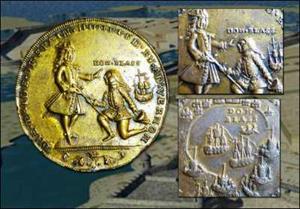When Britain went to war over the ear of a British sailor
During nine years of the 18th century the Spanish and the English were in conflict over trade with America.
Next year, is the 281st anniversary of the death of Blas de Lezo, one of the best Spanish marines in history who died in Cartagena de Indias. Lezo, with hardly 3,500 men and six warships was defending Spanish citizenship against the English fleet, composed of more than 180 sailing ships and 35,000 sailors. This clash was the first in the conflict which Spain and Great Britain maintained between 1739 and 1748 which later would be framed as part of the Austrian War of Succession which provoked war between the main European powers in the middle of the 18th century (1740-1748)

British Naval Medals prepared for capturing Cartagena de Indias which were never presented - Elena Viñas - www.lasprovincias.es
This confrontation is known by the British as ‘The War of Jenkins’ Ear’ (known as Guerra del Asiento in Spain). Although the origin of this conflict could not be more banal, the underlying motives between Spain and England for the whole century were over the Spanish monopoly with trade with America.
The fuse was lit with the capture in 1731 by the Spanish coastguards an English privateer ship captained by the pirate Robert Jenkins. Seven years later, in the framework of a warmongering campaign by the opposition Tories to the Government of the Whigs presided by Robert Walpole, Robert Jenkins declared in the House of Commons that the Spanish captain Juan León Fandiño had cut off his ear as he said (according to the declaration of the British Navy) ‘Go and tell your king that I will do the same thing to him, if you dare’.
His appearance was accompanied by large warmongering paraphernalia given that Jenkins appeared with his ear in a jar. The declarations of the Spanish marine were taken as offensive by the English king and unleashed a wave of patriotic fervour after which, without much enthusiasm, Robert Walpole declared war against Spain on October 23 1739.
The war ended in 1748 with the signing of the Treaty of Aix-la-Chapelle, sometimes called the Treaty of Aachen, although there were only skirmishes from 1742 and supposed to be one of the biggest defeats in the history of the British Navy. The agreement was limited to the previous status quo, and in practice allowed Spain to keep her Atlantic monopoly
